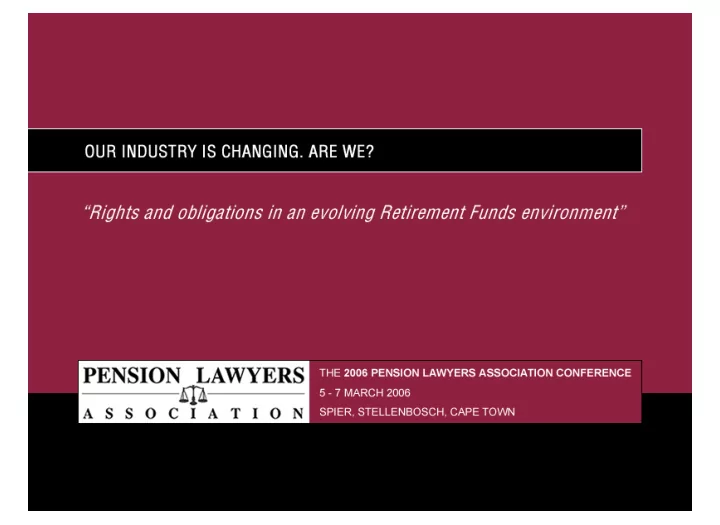

DO THE TRUSTEES OWE A FIDUCIARY DUTY TO MEMBERS? Graham Damant from Bowman Gilfillan
Tek Corporation Provident Fund & Others v Lorentz [1999] 4 All SA 297 (A) “The trustees of the fund owe a fiduciary duty to the fund and to its members and other beneficiaries….. The employer is not similarly burdened but owes at least a duty of good faith to the fund and its members and beneficiaries.”
Meyer v Iscor Pension Fund [2003] 1 All SA 40(SCA) “ The general proposition that the trustees of the Fund are under a fiduciary duty to act in the best interest of the members, appears to be supported by authority (see eg Tek Corporation Provident Fund and others v Lorentz 1999 (4) SA 884 (SCA) at 898H-I). I accept that the trustees’ fiduciary duty towards its members includes a duty of impartiality, that is , an obligation not to discriminate between members unfairly.”
Retirement Fund Reform “the statutes state that trustees of funds owe a fiduciary duty to their funds and a duty of good faith to all stakeholders.”
CURRENT THINKING BOARD Duty of Good Fiduciary Duty Faith Duty of EMPLOYER FUND Fiduciary Duty Good Faith MEMBER
REFORM BOARD Duty of Good Fiduciary Duty Faith EMPLOYER FUND Duty of Good Faith MEMBER
ALTERNATIVE PROPOSITIONS BOARD Fiduciary Duty FUND Duty of Duty of Good Good Faith Faith EMPLOYER MEMBER
BACKGROUND 1. No real analysis. 2. Based on English Law. 3. In English Law Pension Funds are Trusts. 4. Trustees in fiduciary relationship with beneficiaries. 5. In SA Pension Funds are body corporate. 6. Statutory duties imposed on Board. 7. Analogy with Company Law.
CONSEQUENCES IF NO FIDUCIARY DUTY 1. Ability of member to sue Trustees directly. 2. Cause of action. 3. Defenses available to Trustees. 4. Weighing up competing interest of employer and member in a DB context � Benefit improvements � Surplus apportionment
ABILITY TO SUE TRUSTEES DIRECTLY 1. Non-vested rights or vested rights. 2. Vested rights – sue Fund. If sue fund – impact on member interests. � 3. Non-vested rights – Fund to sue Trustees. Appointment of curator. � In Company Law Derivative Action. �
COMMON LAW DERIVATIVE ACTION? Gross vs Pentz 1996 (4) 617A 1. General rule is executor must act on behalf of estate. 2. The exception: “When an executor cannot sue, because his own acts and conduct, with reference to the testator’s estate, are impeached, relief which could be sought by the executor alone, may be obtained at the suit of a party beneficially interested in the proper performance of his duty.”
CAUSE OF ACTION AND DEFENCES Cohen No v Segal 1970 (3) SA 702 (W): “ In our law the action based on breach of trust is sui generis.” Du Plessis NO v Phelps 1995 (4) SA 165 (C) “ Liability for a breach by a director of his fiduciary duties, on the other hand, does not necessarily involve dolus or culpa.”
WHAT IS A FIDUCIARY DUTY 1. The duties arising from such fiduciary relationships depend on the circumstances giving rise to them. 2. To describe someone as a fiduciary, without more, is meaningless without further analysis, for it is the nature of the fiduciary relationship that justifies the particular fiduciary obligations attaching to it: see eg Re Coomber, Coomber v Coomber 1911 1 Ch 723 (CA) 728-729;
DUTIES Duty not to exceed powers � Mistake of fact not a breach � Mistake of law is breach Duty to execute powers for a proper purpose � Not to obtain private advantage � Act in the bona fide interest of the fund � Act fairly between different classes of members Duty to exercise independent and unfettered discretion and to avoid Conflict of interest
IN EXAMINING THESE DUTIES THEY ARE CLEARLY OWED TO THE FUND? BUT ARE THEY APPROPRIATE FOR MEMBERS INDIVIDUALLY?
A DUTY TO ACT IN THE BEST INTERESTS OF THE MEMBERS? TEK and Iscor � How is it exercised between members with competing interests? � How is it exercised where competing interests between fund and members? � What is the consequence where there is a competing employer interest? � Benefit improvements � Surplus apportionment � Employer surplus account
WHEN DOES A FIDUCIARY RELATIONSHIP ARISE? Phillips vs Fieldstone Africa (Pty) Ltd and another “ Relationships in which a fiduciary obligation has been imposed are marked by three characteristics: (1) Scope for the exercise of some discretion or power; (2) That power or discretion can be used unilaterally so as to effect the beneficiary's legal or practical interests; and (3) A peculiar vulnerability to the exercise of that discretion or power. I agree that that analysis is helpful in the identification of such a relationship although not decisive.”
APPLICATION OF THE PHILLIPS TEST Applying the test it appears that there is often a discretion which can be applied unilaterally and which impacts on member interest. There is a vulnerability to that power.
APPLICATION OF THE PHILLIPS TEST TO THE EMPLOYER � In a DB context: � There is scope for the exercise of a discretion � The power or discretion can be exercised unilaterally so as to effect the beneficiaries legal or practical interest. � A peculiar vulnerability to that discretion or power
A MODEL FOR THE FUTURE? BOARD Fiduciary Fiduciary Duty Fiduciary Duty Duty FUND EMPLOYER MEMBERS
Recommend
More recommend